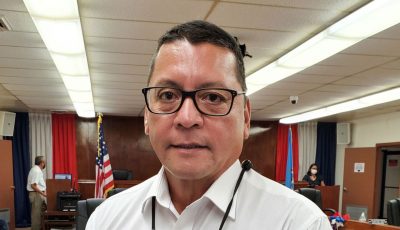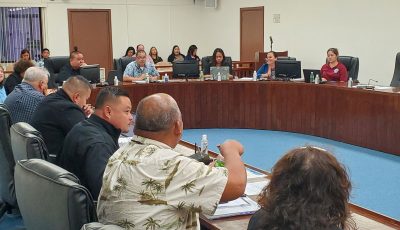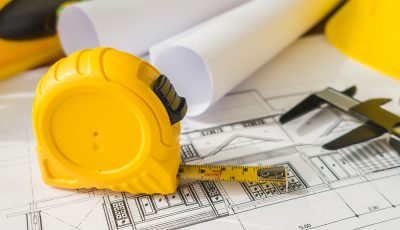‘Enough with doing more with less’
The largest school in terms of population on island, Marianas High School with over 1,560 students, has a maintenance staff of one.
Tanapag Middle School also has one person maintaining its grounds, while Hopwood Junior High School also has limitations on its personnel as well as funds in addressing maintenance issues—one of which are water leaks—which MHS incidentally has solved, TMS is working on, and Hopwood indicating no current projects.
The three schools led utilities costs among the Public School System’s locations and schools, according to data presented by Derek Sasamoto, PSS director of finance and budget, who pointed to suspected water leaks as the cause.
MHS leads with 27 percent of total PSS costs, Hopwood is at 13 percent, and Tanapag is at 6 percent of total costs.
Saipan Tribune interviewed the principals of these three schools on their current cost-cutting measures and water leak and maintenance issues, with all three expressing the need for more locals funds for support services.
‘Do we have the money?’
In an interview, Hopwood principal Jonas Barcinas lamented a lack of funds to shore up deficiencies at the Hopwood campus, adding that the government “is not really taking care of business in terms of prioritizing education.”
“In order for us to really elevate the learning, the school facilities need to be safe and conducive for the kids,” he said.
He pointed at termite-infestation as one problem the school faces.
“None of the government leaders have ever come over here and said, ‘Jonas, can I see your building? Let’s help you out.’ Nothing,” he said.
Barcinas said it was tough for him to solve the water-leak issue, which he blames for most of their utility costs as their use of power is “very little” compared to water.
“This school is maybe 61, 62 years old. All these pipes have been built many years. Think of all the trees that went through the pipes, it might have… bent them, moved them. There has got to be leaks somewhere.”
He suggested the notion of building a new school as renovations would cost millions.
“Why renovate the school when [it will] cost a million dollars? It’s best just to build a new school. [Hopwood] is a great community, it [has a] great staff and is a great place for the kids. It’s just the facility is too old,” he said.
He wishes CUC experts would visit and advise the school on the matter and test for leaks, but noted “we are not about to pay for those things.”
“If they fix the leak, great. But if it’s going to cost breaking things down, fixing, trying to get the leak [fixed] for a big cost, then that’s something that the Board [of Education], the commissioner, everyone needs to think about: Do we have money for those things?” he said.
He said the school has been doing its best to conserve power. “When I say we only have four hours of air-conditioning and all power must be shut off here and there, we adhere to that,” Barcinas said.
According to him, the four hours of AC starts at 8am, and is staggered throughout the day.
“We don’t want to increase our power [bill] because the government is not paying CUC on time. They’re not giving us the money we need in order for us to take care of business,” he said, citing the larger issue of locally appropriated budget for utilities, personnel, and other support services.
Always an issue
“Maintenance is always going to be an issue,” said Ruth Calvo, principal of Tanapag Middle School. “Not just for this school but for every school. That’s why we’re telling people to please support H.L.I. 18-12,” Calvo said.
House Legislative Initiative 18-12, which is on the ballot in November, seeks to raise the minimum percentage of local appropriations for PSS from 15 percent to 25 percent of the government’s budget.
Calvo said AC does not kick in at their main office until 11:30am, with the AC in her office only used during conferences or meetings, adding that these conservative measure have taken effect system-wide.
“If somebody’s not in the office, they just turn [the AC] off. [We do] anything that we can to cut costs,” she said.
“We only have one [maintenance person],” she said, noting that in order “to maintain something, you also have to pay for it.”
She believes maintenance is always going to be an issue with schools, pointing to TMS’ yard as one area that’s difficult to maintain as it has a lot of mud and grass.
However, she prefers to remain optimistic. “I’m confident that with time we will have all those issues addressed,” she said.
She said the PSS Capital Improvement Office has helped TMS with bathroom renovations, and noted that they are helping TMS search for and take care of their water leaks.
‘One man for a 1,560-student campus’
Cabrera said MHS uses the AC for just five hours a day, with AC not used until 9am even as class starts at 8:30am and ACs turned off during lunch.
On water leaks, she said the Commonwealth Utilities Corp. has worked on the problem during July and August this summer.
She pointed the water leaks were behind the “exorbitant” amount of their utility costs.
“[CUC] was on our campus, digging holes everywhere, looking for leaks and fixing [them],” she said.
She said the water leak issue has been solved.
Cabrera believes that MHS needs a staff of three—at least—to maintain their school.
“[We have] one maintenance staff for a school that has 50 classrooms, a gym, a cafeteria. …Our campus is huge [for just one maintenance person],” she said.
According to Cabrera, Emory Fitial collects trash, repairs equipment and facilities, as well as does grass-cutting and tree-trimming.
She noted that it takes almost a week to get the grass cut on campus.
She is pushing for H.L.I. 18-20, noting that it may provide more funds for the school’s support services as federal funds cannot “buy desks, fix broken toilers, or pay for maintenance staff.”
“Those critical areas are not funded,” she said.
She noted that the local budget must also cover CUC costs, so as not to drain funds intended for personnel.
“What suffers is our building maintenance, our ground maintenance,” she said, adding that PSS as a system has had to do “more with less.”
She pointed at how the community and parent volunteers at the school.
“Without these volunteers it’d be very difficult just to do our daily operations,” she said.
According to her, MHS has four volunteers who currently help with maintenance around the school; some of them are former students.



























